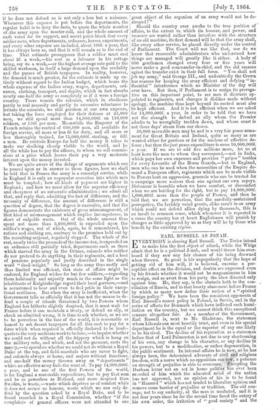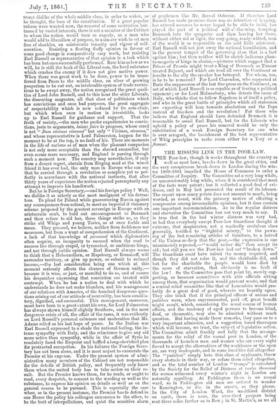EARL RUSSELL AS JONAH. E VERYBODY is abusing Earl Russell. The
Tories intend to make him the first object of attack, while the Whigs admit that he is a political Jonah, and would throw him over- board if they saw any fair chance of his being drowned when thrown. So great is his unpopularity that the hope of getting rid of him will, it is believed, exercise a per- ceptible effect on the division, and doubts are expressed even by his friends whether it would not be magnanimous in him to resign, and so avert from his party the blow directed only against him. He, they say, is the obstacle both to the con- ciliation of Russia, and to that hearty abasement before France by which so many now define their notion of a "spirited foreign policy." We have been the consistent opponents of Earl Russell's recent policy in Poland, in Servia, and in the series of efforts for Denmark which have inflicted such humi- liation on the country, but we cannot think this exceptional censure altogether fair. As a member of the Government, Earl Russell is, next to Mr. Gladstone, the statesman whom Liberals can most heartily trust, and even in his special department he is the equal or the superior of any one likely to be his rival. The decline of his reputation as a statesman before that of Lord Palmerston is not due to any shortcoming of his own, any change in his character, or any decline in his powers, but to a modification, or rather degeneration, in the public sentiment. In internal affairs he is DOW, as he has always been, the determined advocate of civil religious freedom, with a nerve which no opposition can a patience no strength of prejudice is able to overcome. eepting the Durham letter not an act in home politics has ever been re2orded of him which the educated mind of the nation has not approved, not an opinion of his is to be found in "Hansard" which has not tended to liberalize opinion and remove some barrier of prejudice or tradition. The old cou- rage, not to say audacity, of the man is unabated, and it is not four years since he for the second time faced the outcry of secret dislike of the whole middle class, in order to widen, as he thought, the base of the constitution. If a great popular reform were wanted now, the removal of some restriction but- tressed by vested interests, there is not a member of the Cabinet to whom the nation would turn so eagerly, as a man who would add to liberalism of purpose, to a sincere wish to set men free of shackles, an aristocratic tenacity and vigour of self- assertion. Resisting a floating fluffy opinion in favour. of some good change is comparatively easy work, but resisting Earl Russell as representative of that opinion is a task which has been but once successfully performed. Rate hinias low as we will, he is still the beak of the Liberal ram, the hard substance which crushes the enemy if it does not give motive power. When there was great work to be done, power to be trans- ferred from Peers to the middle class, an ulcer of growing pauperism to be cut out, an intolerable system of trade restric- tions to be swept away, the nation recognized the great quali- ties of Lord John Russell, and to this hour the older Liberals, the dissenting magnates, all that class of politicians which has convictions and once had purposes, the great aggregate of respectability which is now seduced by its arm-chair, but which when once in motion is irresistible, looks up to Earl Russell for guidance and support. That the froth of society,—the men who prefer expediencies to convic- tions, jests to arguments, laissez faire to progress, whose creed is not "Dam vivimus vivamus" but only " Vivimus, vivamus," and whose representative is Lord Palmerston, happen for the moment to be at the top, is no fault of his. There are moments in the life of nations as of men when the pleasant companion is not only more acceptable than the shrewd counsellor, but even seems more necessary, and England is passing through such a moment now. The country may nevertheless, if only from a decent regret, abstain from flinging mud at the wisest friend it has ever had, the only man in Europe who can say that he carried through a revolution so complete yet so per- fectly in accordance with the national instincts, that after thirty years of experience the nation rejected peremptorily any attempt to improve his handiwork. But he is Foreign Secretary,—and his foreign policy ? Well, we dislike it as utterly as the most malignant of his detrac- tors. To plead for Poland while guaranteeing Russia against any consequences from refusal, to meet an imperial if visionary scheme proposed by the greatest sovereign in Europe with an aristocratic snub, to hold out encouragement to Denmark and then refuse to aid her, these things strike us, as they strike old Whigs and young Tories, as at once feeble and mean. They proceed, we believe, neither from feebleness nor meanness, but from a want of comprehension of the Continent, a lack of that knowledge of personnel which diplomatists often acquire, an incapacity to succeed when the road to success lies through stupid, or tyrannical, or ambitious kings, and not through public opinion. Earl Russell always seems to think that a Hohenzollern, or Hapsburg, or Romanoff, will surrender territory, or give up power, or submit to reduced income,—the last consideration being one which at this moment seriously affects the chances of German unity,— because it is wise, or just, or merciful to do so, and of course his despatches expressing that conviction are treated with contempt. When he has a nation to deal with which he understands he does not make blunders, and his management of our relations with America, of the hundred dangerous ques- tions arising out of our attitude of neutrality, has been concilia- tory, dignified, and successful. This management, moreover, must have been to a great extent his own, for Lord Palmerston has always shown himself slightly Southern, and in the most dangerous crisis of all, the affair of the rams, it was evidently on Lord Russell's personal calmness and moderation that Mr. Adams relied as his last hope of peace. In the Italian war Earl Russell expressed to a shade the national feeling, the in- tense sympathy with Italy, and the reluctance to give any aid more active than sympathy, while in the affair of Syria he resolutely faced the Emperor and baffled along-cherished plan for protracted occupation. In his failures the Foreign Secre- tary has not been alone, and it is most unjust to exonerate the Premier at his expense. Under the present system of admi- nistration many members of the Cabinet are not responsible for the details of British policy, and frequently only know them when the united body has to take action on their re- sult. But the Premier knows them, for he reads, or ought to read, every despatch, to consent to the wording as well as the substance, to express his opinion on details as well as on the general course to be pursued. This is especially the case when, as in the present instance, the Premier has to defend in one House the policy his colleague announces to the other, to be the butt of interpellations, and quiet the sensitive alarm I of gentlemen like Mr. Bernal Osborne. If therefore Lord Russell has made promises there was no intention of keeping, has uttered menaces he never hoped to be able to fulfil, has played the part of a political will-o'-the-wisp, tempting Denmark into the quagmire aud then leaving her there, without either aid or light, the easy-going, ready-witted, man of the world is as responsible as the cold little aristocrat. Earl Russell will not jest away the national humiliation, and in the present temper of the governing class that is a fact against him ; but then neither will he sketch ludicrous phan- tasmagoria of kings in chains,—pictures which suggest that a Prince of Prussia might treat a King of Denmark as Timour treated Bajazet, and which are read all over the Continent as insults to the ally the speaker has betrayed. For whom, too, is he to be removed ? For Lord Clarendon, who supported at Paris the suppression of the last free press on the Continent, on act of which Lord Russell is as capable as of fearing n political opponent ; or for Lord Malmesbury, who detests the cause of Italy, who thinks that to follow Napoleon is of itself a policy, and who in the great battle of principles which all statesmen are expecting will lean towards absolutism and the Pope instead of freedom and the revolution ? For those who believe that England should have defended Denmark it is reasonable to assail Earl Russell, but for the Liberals who uphold a policy of peace his removal would be only • the substitution of a weak Foreign Secretary for one who is over arrogant, the banishment of the best representative of Whig principles to make room either for a Tory or a flaneur.































 Previous page
Previous page